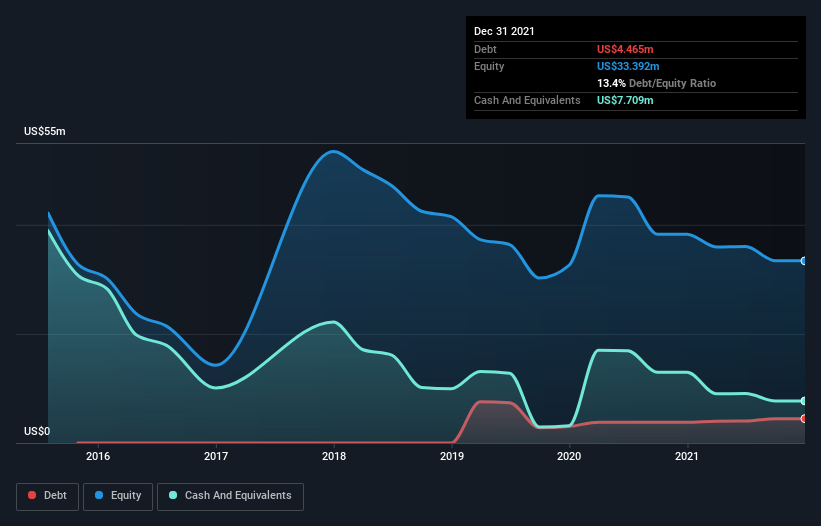Is Tissue Regenix Group (LON:TRX) Using Debt Sensibly?
The external fund manager backed by Berkshire Hathaway's Charlie Munger, Li Lu, makes no bones about it when he says 'The biggest investment risk is not the volatility of prices, but whether you will suffer a permanent loss of capital.' When we think about how risky a company is, we always like to look at its use of debt, since debt overload can lead to ruin. We note that Tissue Regenix Group plc (LON:TRX) does have debt on its balance sheet. But the more important question is: how much risk is that debt creating?
When Is Debt A Problem?
Debt is a tool to help businesses grow, but if a business is incapable of paying off its lenders, then it exists at their mercy. Ultimately, if the company can't fulfill its legal obligations to repay debt, shareholders could walk away with nothing. However, a more common (but still painful) scenario is that it has to raise new equity capital at a low price, thus permanently diluting shareholders. Of course, plenty of companies use debt to fund growth, without any negative consequences. The first thing to do when considering how much debt a business uses is to look at its cash and debt together.
View our latest analysis for Tissue Regenix Group
What Is Tissue Regenix Group's Debt?
As you can see below, at the end of December 2021, Tissue Regenix Group had US$4.47m of debt, up from US$3.79m a year ago. Click the image for more detail. However, its balance sheet shows it holds US$7.71m in cash, so it actually has US$3.24m net cash.
How Healthy Is Tissue Regenix Group's Balance Sheet?
We can see from the most recent balance sheet that Tissue Regenix Group had liabilities of US$4.36m falling due within a year, and liabilities of US$8.47m due beyond that. Offsetting this, it had US$7.71m in cash and US$3.60m in receivables that were due within 12 months. So its liabilities outweigh the sum of its cash and (near-term) receivables by US$1.52m.
Since publicly traded Tissue Regenix Group shares are worth a total of US$39.1m, it seems unlikely that this level of liabilities would be a major threat. But there are sufficient liabilities that we would certainly recommend shareholders continue to monitor the balance sheet, going forward. While it does have liabilities worth noting, Tissue Regenix Group also has more cash than debt, so we're pretty confident it can manage its debt safely. The balance sheet is clearly the area to focus on when you are analysing debt. But ultimately the future profitability of the business will decide if Tissue Regenix Group can strengthen its balance sheet over time. So if you're focused on the future you can check out this free report showing analyst profit forecasts.
Over 12 months, Tissue Regenix Group reported revenue of US$20m, which is a gain of 20%, although it did not report any earnings before interest and tax. We usually like to see faster growth from unprofitable companies, but each to their own.
So How Risky Is Tissue Regenix Group?
Statistically speaking companies that lose money are riskier than those that make money. And we do note that Tissue Regenix Group had an earnings before interest and tax (EBIT) loss, over the last year. Indeed, in that time it burnt through US$5.0m of cash and made a loss of US$4.8m. Given it only has net cash of US$3.24m, the company may need to raise more capital if it doesn't reach break-even soon. Overall, we'd say the stock is a bit risky, and we're usually very cautious until we see positive free cash flow. When analysing debt levels, the balance sheet is the obvious place to start. However, not all investment risk resides within the balance sheet - far from it. For instance, we've identified 1 warning sign for Tissue Regenix Group that you should be aware of.
Of course, if you're the type of investor who prefers buying stocks without the burden of debt, then don't hesitate to discover our exclusive list of net cash growth stocks, today.
Have feedback on this article? Concerned about the content? Get in touch with us directly. Alternatively, email editorial-team (at) simplywallst.com.
This article by Simply Wall St is general in nature. We provide commentary based on historical data and analyst forecasts only using an unbiased methodology and our articles are not intended to be financial advice. It does not constitute a recommendation to buy or sell any stock, and does not take account of your objectives, or your financial situation. We aim to bring you long-term focused analysis driven by fundamental data. Note that our analysis may not factor in the latest price-sensitive company announcements or qualitative material. Simply Wall St has no position in any stocks mentioned.

 Yahoo Finance
Yahoo Finance 
